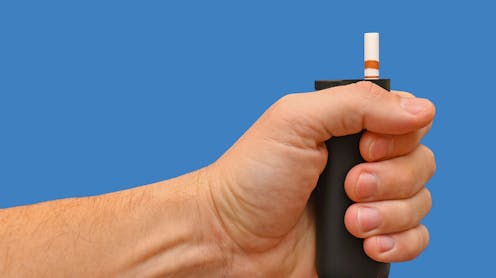As heated tobacco products reenter the US market, evidence on their safety remains sparse – new study
- Heated tobacco products, such as IQOS and Ploom, are reentering the US market despite limited evidence on their safety.
- The majority of studies on heated tobacco products’ safety are funded by tobacco companies, which can lead to biased results and a lack of transparency.
- A new review found that heated tobacco products may not reduce health risks for smokers, but rather pose similar or even increased health risks compared to smoking traditional cigarettes.
- The long-term health effects of heated tobacco products are unknown, and it’s unclear whether they can help smokers quit or reduce the risk of disease and death.
- More research is needed to fully understand the safety and efficacy of heated tobacco products, particularly in light of other available products and interventions that have been proven to help smokers quit.

Heated tobacco products are often marketed by tobacco companies as less harmful than cigarettes, but they can pose health risks to users, according to a new review I co-authored in the journal Tobacco Control. Evidence on their health risks in people who smoke is limited, sometimes contradictory, and hard to make sense of.
Heated tobacco products are electronic devices that heat tobacco so users can inhale nicotine. Common brands include IQOS, available in the U.S., and Ploom and Glo, sold in other countries.
Heated tobacco products are different from e-cigarettes, though they may look similar. E-cigarettes, which are also called vapes, heat a liquid containing nicotine but not tobacco, whereas heated tobacco products heat actual tobacco leaf. Heated tobacco products are also different from traditional cigarettes, which burn tobacco rather than heating it. These distinctions matter because it’s the burning of tobacco leaf – not the nicotine – that directly causes the disease and death associated with smoking.
There is limited long-term data about the health harms of heated tobacco products. My colleagues and I analyzed the available data, drawn from 40 clinical trials, that followed participants who used these products for a year or less. We looked at molecular changes in the blood, breath and urine, called biomarkers, to explore the potential risks of heated tobacco products.
The studies we reviewed reported changes in 143 different biomarkers, including measures linked to heart disease and cancer. But drawing clear conclusions from the data was hard because of issues with the available evidence. Of the 40 studies, 29 were funded by the tobacco industry. Furthermore, 31 of the 40 studies were conducted in confined settings, meaning that participants’ activities and their use of the assigned product were controlled. This may not reflect heated tobacco products’ real-world use.
If heated tobacco products are less harmful than cigarettes, we would expect to see largely beneficial effects in smokers who switched to them. However, the evidence we reviewed was inconclusive. Though most studies suggested that heated tobacco products might reduce risks of disease compared with smoking, other studies found no difference, or even the potential of increased risk. Compared with quitting smoking completely, use of heated tobacco products had more consistently harmful effects.
Few studies have directly compared the effects of heated tobacco products with e-cigarettes. However, many independently funded, longer-term studies have examined e-cigarettes and have shown they can help people stop smoking and reduce health risks in people who switch completely from smoking to vaping.
Why it matters
Heated tobacco products may be coming to a town near you – or already be there. They are already widely used in Japan. IQOS was removed from the U.S. market in 2021 after a court ruled that the product had infringed on an existing patent. However, following a flurry of promotional activities, IQOS relaunched in March 2025 in Austin, Texas. Like most heated tobacco product brands, IQOS is owned by one of the largest cigarette companies in the world, Philip Morris International.
The company claims it wants to bring IQOS to the U.S. market to provide smoking adults a “better alternative” to cigarettes. But the science we’ve reviewed on whether heated tobacco products are truly healthier is inconclusive. Our review found inconsistencies in data on health effects, and other research suggests these products may not help smokers quit.
What still isn’t known
We do not know the long-term health effects of heated tobacco products, nor whether they can actually reduce the risk of disease and death in people who switch from smoking to using heated tobacco products. It is also unclear how heated tobacco products fit into the wider tobacco and nicotine market, especially in light of other available products and interventions already proved to help smokers quit.
While our findings do not rule out the possibility that these products have fewer health risks than cigarettes, they provide little support for such claims.
![]()
Jamie Hartmann-Boyce receives research funding for tobacco related research from the US NIH-FDA and Cancer Research UK. She has provided research consultancy for the Truth Initiative. Her involvement in this work was not funded and the views expressed here are those of the researchers and do not necessarily represent those of her funders. Other authors of this work are funded by Bloomberg Philanthropies as part of the Bloomberg Initiative to Reduce Tobacco use. This funder had no role in the study design, data collection and analysis, decision to publish, or preparation of the manuscript.
